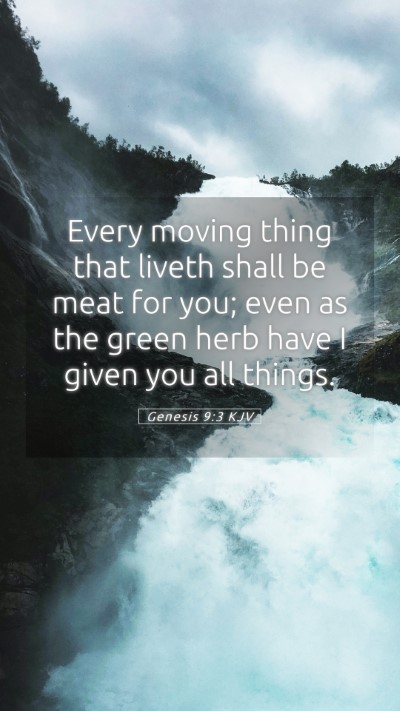Understanding Genesis 9:3
The verse Genesis 9:3 states: "Every moving thing that liveth shall be meat for you; even as the green herb have I given you all things." This passage opens a significant transition in the dietary laws as approved by God following the flood.
Bible Verse Commentary
In this section, we will explore the Biblical interpretations and meanings as drawn from noted commentaries.
General Meaning
Genesis 9:3 highlights God's allowance for humanity to consume animal flesh, which marks a departure from the plant-based diet originally given at creation (Genesis 1:29). The passage signifies both a divine concession and a new phase in man's relationship with creation.
Insights from Commentaries
-
Matthew Henry: Henry notes that this verse signifies a broader mercy of God. After the flood, as the earth was replenished, God permits Noah and his descendants to eat meat, which emphasizes man's dominion over the animal kingdom. This shift reflects the changing nature of life post-flood, where survival involved the consumption of animals.
-
Albert Barnes: Barnes elaborates on the implications of this divine permission. He points out that God’s approval to consume flesh was paired with a responsibility to respect the sanctity of life, indicating that even though consumption of animals is permitted, it should not lead to cruelty.
-
Adam Clarke: Clarke comments on the significance of the phrase "even as the green herb." This comparison illustrates that just as God provided plants for food, He now permits His creatures to use animals as nourishment, which implies a continued provision from God. However, it also implies a change in the natural order necessitated by humankind's fall and the subsequent judgment of the flood.
Theological Implications
This verse not only signifies a dietary change but also carries significant theological weight. It symbolizes God's ongoing care and guidance for humanity, even post-judgment. The permissive will of God allows His creation to thrive and adapt in response to changing circumstances. Moreover, it invites believers to reflect on humanity’s role in creation—balancing stewardship and consumption.
Practical Applications
Application in Daily Life
The implications of Genesis 9:3 extend to how we view our diet. Understanding the spiritual responsibility behind consumption encourages ethical eating practices and sustainability. It also provides a framework for how we treat living creatures and our stewardship of the Earth.
Bible Study Insights
In Bible study groups, Genesis 9:3 can be a conversation starter about dietary preferences and responsibilities as stewards of God's creation. Questions like "How does this verse influence our understanding of animal rights?" or "What does it mean to have dominion over the animals?" promote deeper engagement.
Cross References
- Genesis 1:29 - Original dietary instructions to humanity.
- Leviticus 11 - Food laws given to Israel detailing clean and unclean animals.
- Acts 10:13-15 - Peter's vision concerning the dietary laws and God's acceptance.
Bible Study Guides and Resources
For further exploration of this verse and its implications, consider using Bible study tools such as commentaries, lexicons, and historical context resources. Understanding Scripture deeply requires engaging with the text and its interpretations through various lenses:
- Bible Study Lessons: Creating focused lessons around Genesis 9:3 can yield rich discussions.
- Online Bible Study: Engaging in virtual discussions can broaden perspectives.
- Bible Study Materials: Utilizing various translations and commentaries will enhance understanding.
Conclusion
Genesis 9:3 serves as a pivotal moment in Scripture, denoting a significant shift in human practices with animals. Exploring this verse through various commentaries provides profound insights that enrich our understanding of God's intentions and our responsibilities as believers.


